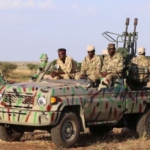
Following the suspension of an earlier agreement to purchase fighter jets and military equipment, the Defense Industries System sent a high-level delegation to Pakistan to sign a new contract for the supply of aircraft, drones, and armored vehicles.
The visit took place recently, specifically after technical and political obstacles prevented the completion of the initial deal dated August 24, 2025.
According to the Pakistani outlet “The Current”, the delegation was headed by General Mirghani Idris, Director of the Defense Industries System, who is currently under U.S. and European sanctions.
The delegation also included several senior military and security officials. Among them Lieutenant General Magdi Ibrahim, Deputy Chief of Staff; Lieutenant General Mohamed Ali Sabir, Head of Military Intelligence; Brigadier General Al-Mu’tasim Abdullah Al-Haj, Deputy Director-General of the Defense Industries System for Product and Defense Services Development; and Colonel Engineer Abd Al-Aleem Al-Tayeb Al-Awad, CEO of Safat Aviation Group. The delegation met with Mr. Muhammad Raza Hayat Harraj, Federal Minister for Defense Production in Islamabad, to finalize discussions and sign the terms of the new agreement.
Relevant authorities clarified that the revision of the previous agreement came after China refused to export HQ-9 and HQ-16 air defense systems, given that these systems are of Chinese origin and Beijing refrains from supplying them to countries involved in conflict or under international sanctions.
It was also reported that the sale of engines and navigation systems for MiG-21 aircraft became unfeasible after third countries declined to provide Pakistan with these vital components—prompting both sides to restructure the deal and replace its contents with alternative systems.
The new contract stipulates the supply of weapons and equipment including 30 K-8 trainer/attack aircraft, 40 Shahpar-2 drones, 200 MR-10 drones, and 230 ASV Mohafiz-IV armored vehicles. The total value of the deal is estimated at around $230 million.
Logistically, it was agreed that the aircraft and armored vehicles would be delivered through Port Sudan, while the drones would be transported to Wadi Sayyidna Air Base, according to a mutually approved schedule.
This shift in the deal’s composition reflects both parties’ ability to renegotiate and adapt the contract in response to international restrictions and supply chain challenges.
The new agreement raises questions regarding its security and regional implications, particularly in light of international sanctions imposed on the leadership of the Defense Industries System, and the need to monitor accompanying maintenance, operation, and training mechanisms to ensure the operational readiness of the delivered equipment


